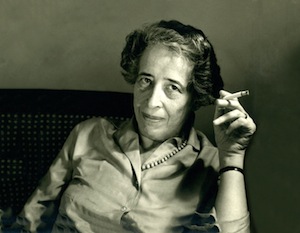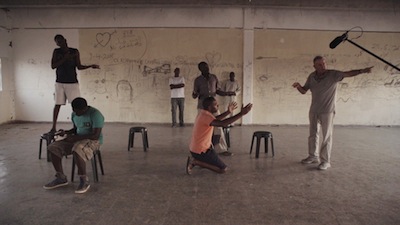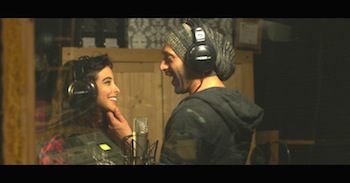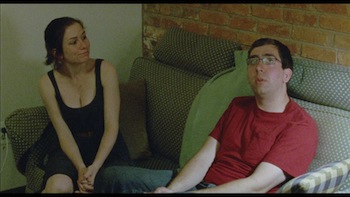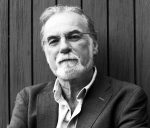Author Deborah E. Lipstadt, right, with actor Rachel Weisz, who portrays Lipstadt in the film Denial. (photo by Liam Daniel/Elevation Pictures)
In 1996, Deborah Lipstadt, an American historian and author of Denying the Holocaust, was sued by British Holocaust denier David Irving. Unlike in the United States, British courts put the onus on the defendant to prove they did not libel the plaintiff. But this trial had larger stakes than whether Lipstadt (and her publisher, Penguin Books) were guilty of libeling Irving by characterizing him as a denier of the Holocaust. To media and many in the general public, the case put the Holocaust on trial.
A major motion picture scheduled for release Oct. 7 in Montreal, Toronto and Vancouver, is a retelling of the events around the trial. The film, Denial, starring Rachael Weisz as Lipstadt, captures the contending forces inside and outside the Jewish community as the trial burst onto the global news cycle.
Lipstadt told the Independent in a telephone interview Sunday that the film focuses emphatically on actual events. Insubstantial details may have been changed – a meeting portrayed as taking place in a restaurant actually took place elsewhere; she didn’t own a dog at the time of the trial – but the substance of the film was subject to absolutely no dramatic or artistic licence.
“Every word that comes out of David Irving’s mouth is exactly as he said it,” Lipstadt offered by way of example. In fact, the film opens with remarks Irving made in Calgary and every statement he makes throughout the film seems intended not to convince but to rub salt in historical wounds.
The film captures Lipstadt’s frustration with the strategy of her British legal team, which refused to allow Lipstadt or survivors of the Holocaust to testify. Lipstadt thought she would be seen as a coward for not speaking in court and, in a poignant scene in the film, she promises a survivor of the Holocaust that the voices of survivors will be heard. Her lawyers stood firm, however. This was not to be a trial about the Holocaust, they insisted, nor was it a trial about Lipstadt. It was about whether Irving was what Lipstadt had said in her book: a denier of the Holocaust.
She sparred with the legal team throughout but, in retrospect, she is completely happy with their strategy.
“Absolutely 110%,” she said. “First of all, we won. Second of all, not only did we win, but we got the most damning judgment, one of the most crushing libel judgments against anyone that has ever been issued, certainly in recent years, against anyone in England. [The judgment] calls the man a liar, a falsifier of history, his version of history is mendacious, that no sane, thinking historian could ever doubt the existence of gas chambers at Auschwitz. In fact, everything we needed. Obviously, the lawyers’ strategy was precisely the right one. It would not have added anything to have me go in on the stand. It would not have added anything to have survivors go on the stand. This wasn’t an emotional excursion to make me feel good that I can stand up there and challenge Irving or could give survivors a modicum of comfort that they could stand and confront him. This was to win a major case and that was what it was about.”
In fact, of the whole experience, which on film appears to be a horribly emotional and wrenching multi-year battle through arcane legalities and unanticipated notoriety, Lipstadt would only change one thing if she could.
“I might have learned to trust the lawyers faster than I learned to trust them,” she said.
The trial and the events around it did not affect her academic career – she was then and is now a professor at Emory University in Atlanta – but it allowed her a bigger stage.
“It gave me a far higher profile than I had before,” she said. “I don’t think it’s changed me, but it’s changed the size of the megaphone I happen to have to speak out on things.”
While Lipstadt was not formally involved in the making of the film, she credits the filmmakers and Weisz, who depicted her, for their willingness to engage her.
“No film will be made if the author of the book is going to be meddling,” she said. “They would never go ahead with that. But the filmmakers were exceptionally generous with wanting my input … passing the script by me, meeting with me, the director coming to Atlanta to meet with me, the screenwriter coming to meet with me, and Rachel Weisz asking for my help … in my spending time with her and hanging out with her and talking with her. Not just about the role, but about myriad things. They gave me far more input than is normally the case.”
When she saw a pre-final cut of the film the first time, it was with a test audience in a multiplex, and it left her “sort of speechless,” she said.
“You can buy your popcorn and your oversized Coca-Cola and go into your reclining chair and there was my story on the screen,” she said. “It was very weird. It was very, very stunning and very, very weird.”
She hopes the film helps people understand that not everything is subject to opinion.
“There are facts,” she said. “There are not two sides to every opinion. Not everything is up for grabs. There are facts, opinions and lies. I could say to you, it’s my opinion that the earth is flat. Well, just because it’s my opinion that the earth is flat doesn’t make it flat. Not all opinions hold water. Some opinions are based in ridiculous, nonfactual … claims.”
She also encountered, particularly in Britain but elsewhere as well, Jewish individuals and groups who believed that by not settling with Irving and instead going to trial, Lipstadt was giving Irving a platform he did not deserve. Similar to the way she came around to see her legal team’s strategy as the right course, Lipstadt believes those who thought she should settle now realize that going to trial was the right course.
“You can’t fight every battle, but there are certain battles you cannot turn away from and certain battles you have to take on,” she said. “There were lots of people who didn’t want me to fight this and I did and I’m glad I did. And I think they are glad I did, too. Lots of those people came around and recognize that we were right and they had been wrong.”






